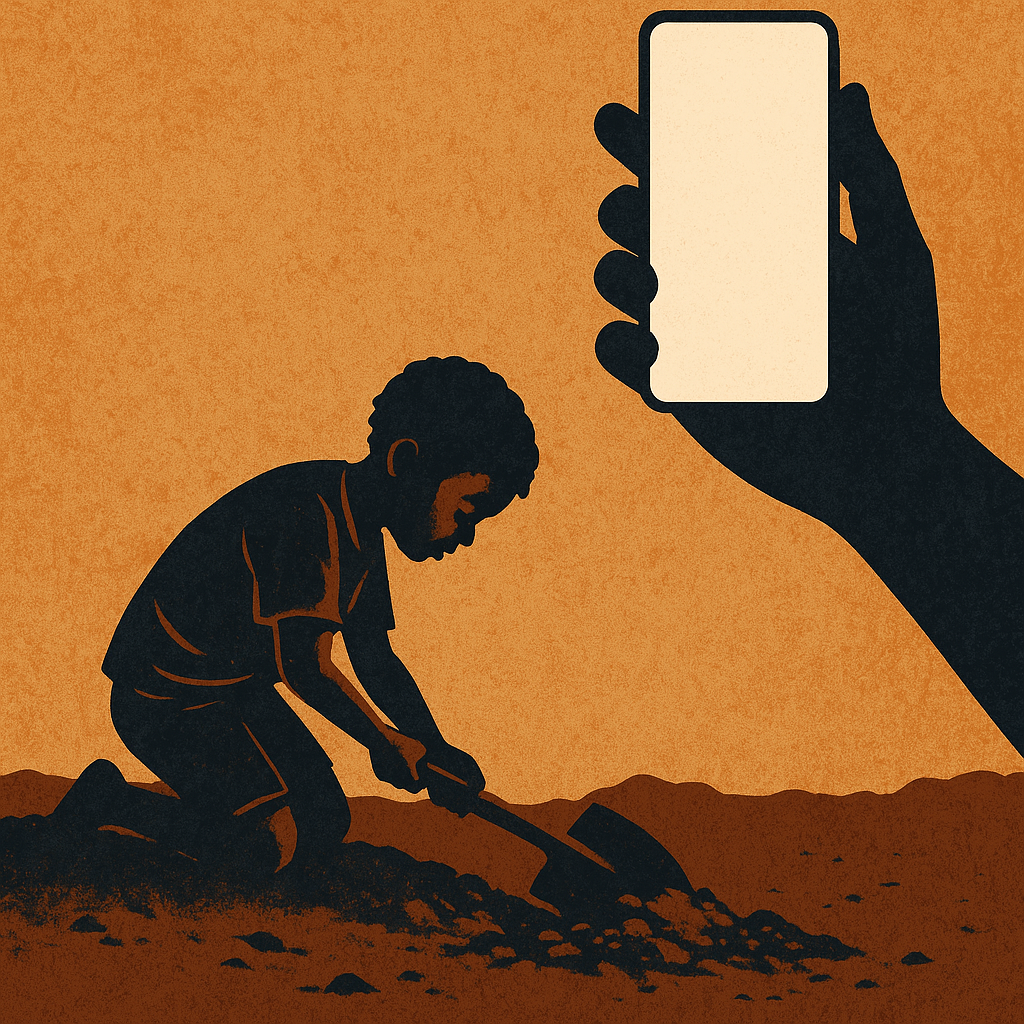Every day, children in the Democratic Republic of Congo (DRC) dig deep into toxic soil with their bare hands to mine cobalt; the metal essential to your phone, your laptop, your tablet, and your electric car. Some are six years old. Some never return home.
This is not a rare abuse. It is the hidden foundation of our global tech economy. Roughly 72% of the world’s cobalt comes from the DRC, much of it mined under brutal and illegal conditions. And still, companies and consumers continue to benefit, without asking enough questions about what it really costs.
Let us be clear: a child’s life is worth more than a battery upgrade.
As young people ourselves, we cannot ignore the contradiction. While we pursue education, social lives, and opportunity, children our age, and younger, are being buried under the weight of a supply chain that values speed over safety, convenience over conscience.
The DRC ranks 164 out of 174 on the World Bank’s Human Capital Index, and global powers like China are exploiting this vulnerability. As the dominant player in cobalt processing, China commands the next step in the supply chain, compounding the ethical blind spot that begins in Congolese soil and ends in consumers’ pockets around the world.
But this is not just about guilt. It’s about action.
Incentivise Clean Cobalt
We call on governments, especially in the EU and China, to update trade agreements to lower tariffs on ethically sourced cobalt. These agreements can make clean cobalt economically competitive, not just morally preferable. Financial incentives work. Companies that care more about quarterly profits than human rights may finally care if the math changes.
The United States should follow, but we recognize the geopolitical complexity. Starting with more pragmatic trade partners can move the needle faster. Once clean cobalt becomes more attractive on the open market, demand for abusive sources will fall.
Launch a Cobalt “Kimberley Process”
We also propose a global treaty modelled after the Kimberley Process, which was created to stop the flow of blood diamonds. Like diamonds, cobalt should come with a certification: one that guarantees it was mined without violating human rights. Such a mechanism would empower importers, manufacturers, and consumers to make informed, ethical choices — and hold violators accountable.
Invest in Alternatives
We need to reduce dependence on cobalt altogether. The technology exists: sodium-ion batteries, lithium iron phosphate, and other alternatives are in development. But R&D is underfunded. We urge developed countries and tech giants to pour resources into scalable cobalt-free energy storage. If we can build AI that writes essays, we can build batteries that don’t rely on child labour.
Fund Legal Aid for Victims
Too often, Congolese families suffering from exploitation have no legal recourse. Courts are distant, expensive, and inaccessible. That’s why we propose the creation of an internationally funded legal aid clinic in the DRC, staffed by both local and international lawyers, to bring civil suits against abusive companies. Litigation is not just a punishment. It’s a deterrent. And it gives power back to the people most harmed.
Sanction the Guilty
We know who the violators are. Mining executives. Supply chain intermediaries. Political enablers. Yet most remain wealthy, anonymous, and protected. It’s time for sanctions: freeze their assets, ban their travel, and refer the worst actors to the International Criminal Court.
Child labour in cobalt mining isn’t just a human rights violation. In some cases, it could rise to the level of a crime against humanity. The international community has the tools — it just needs the will.
Let the Watchdogs In
Finally, the Congolese government must allow independent human rights monitors into the mining zones. Right now, local activists face harassment, and international observers are often blocked. No monitoring means no accountability. Without transparency, the violence continues in the dark. Let them in. Shine the light.
The truth is simple and brutal: we’re all connected to this chain. That doesn’t mean we’re all guilty. But it does mean we’re all responsible.
A better system is possible — one that values lives over lithium. It starts with pressure, innovation, and justice. It ends when no child ever has to die so the rest of us can recharge.
The time to act is now. Not when cobalt becomes cleaner. Not when profits feel safer. Now.
Words by: Lana Kassas, Aya Asma Salem Atia, Sami Boujema, and Mathieu Barlette, students in Grades 10 and 11 at the Bilingual French International School (ICE)




